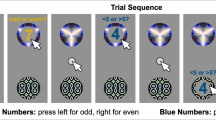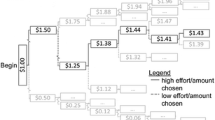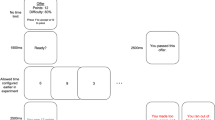Abstract
Many people with schizophrenia exhibit avolition, a difficulty initiating and maintaining goal-directed behavior, considered to be a key negative symptom of the disorder. Recent evidence indicates that patients with higher levels of negative symptoms differ from healthy controls in showing an exaggerated cost of the physical effort needed to obtain a potential reward. We examined whether patients show an exaggerated avoidance of cognitive effort, using the demand selection task developed by Kool, McGuire, Rosen, and Botvinick (Journal of Experimental Psychology. General, 139, 665–682, 2010). A total of 83 people with schizophrenia or schizoaffective disorder and 71 healthy volunteers participated in three experiments where instructions varied. In the standard task (Experiment 1), neither controls nor patients showed expected cognitive demand avoidance. With enhanced instructions (Experiment 2), controls demonstrated greater demand avoidance than patients. In Experiment 3, patients showed nonsignificant reductions in demand avoidance, relative to controls. In a control experiment, patients showed significantly reduced ability to detect the effort demands associated with different response alternatives. In both groups, the ability to detect effort demands was associated with increased effort avoidance. In both groups, increased cognitive effort avoidance was associated with higher IQ and general neuropsychological ability. No significant correlations between demand avoidance and negative symptom severity were observed. Thus, it appears that individual differences in general intellectual ability and effort detection are related to cognitive effort avoidance and likely account for the subtle reduction in effort avoidance observed in schizophrenia.


Similar content being viewed by others
References
American-Psychiatric-Association (Ed.). (2000). Diagnostic and Statistical Manual of Mental Disorders (Fourth, Text Revision Ed.). Washington, DC: American Psychiatric Association.
Andreasen, N. C. (1983). The Scale for the Assessment of Negative Symptoms (SANS) Technical Report. University of Iowa.
Barch, D. M., & Dowd, E. C. (2010). Goal representations and motivational drive in Schizophrenia: The role of prefrontal-striatal interactions. Schizophrenia Bulletin, 36, 919–934.
Baron, R. M., & Kenny, D. A. (1986). The moderator-mediator variable distinction in social psychological research – Conceptual, strategic and statistical considerations. Journal of Personality and Social Psychology, 51(6), 1173–1182.
Cohen, A. S., & Minor, K. S. (2010). Emotional experience in patients with schizophrenia revisited: Meta-analysis of laboratory studies. Schizophrenia Bulletin, 36, 143–150.
Croxson, P. L., Walton, M. E., O’Reilly, J. X., Behrens, T. E., & Rushworth, M. F. (2009). Effort- based cost-benefit valuation and the human brain. Journal of Neuroscience, 29, 4531–4541.
First, M. B., Spitzer, R. L., Gibbon, M., & Williams, J. B. W. (1997). Structured Clinical Interview for DSM-IV- Axis I Disorders (SCID-I). Washington, DC: American Psychiatric Press.
Frith, C. D., Blakemore, S., & Wolpert, D. M. (2000). Explaining the symptoms of schizophrenia: Abnormalities in the awareness of action. Brain Research Reviews, 31, 357–363.
Gold, J. M., Strauss, G. P., Waltz, J. A., Robinson, B. M., Brown, J. K., & Frank, M. J. (2013). Negative symptoms of schizophrenia are associated with abnormal effort-cost computations. Biological Psychiatry, 74, 130–136.
Gold, J. M., Waltz, J. A., Matveeva, T. M., Kasanova, Z., Strauss, G. P., Herbener, E. S., … Frank, M. J. (2012) Negative symptoms and the failure to represent the expected reward value of actions: Behavioral and computational modeling evidence. Archives of General Psychiatry, 69(2):129–138.
Greenzang, C., Manoach, D. S., Goff, D. C., & Barton, J. J. (2007). Task-switching in schizophrenia: Active switching costs and passive carry-over effects in an antisaccade paradigm. Experimental Brain Research, 181, 493–502.
Heerey, E. A., & Gold, J. M. (2007). Patients with schizophrenia demonstrate dissociation between affective experience and motivated behavior. Journal of Abnormal Psychology, 116, 268–278.
Heerey, E. A., Matveeva, T. M., & Gold, J. M. (2011). Imaging the future: Degraded representations of future rewards and events in schizophrenia. Journal of Abnormal Psychology, 120, 483–489.
Heerey, E. A., Robinson, B. M., McMahon, R. P., & Gold, J. M. (2007). Delay discounting in schizophrenia. Cognitive Neuropsychiatry, 12, 213–221.
Kirkpatrick, B., Strauss, G. P., Nguyen, L., Fischer, B. A., Daniel, D. G., Cienfuegos, & Marder, S. R. (2011). The Brief Negative Symptom Scale: Psychometric properties. Schizophrenia Bulletin, 37, 300–305.
Kool, W., McGuire, J. T., Rosen, Z. B., & Botvinick, M. M. (2010). Decision making and the avoidance of cognitive demand. Journal of Experimental Psychology. General, 139, 665–682.
Lesh, T. A., Niendam, T., Minzenberg, M. J., & Carter, C. S. (2011). Cognitive control deficits in schizophrenia: Mechanisms and meaning. Neuropsychopharmacology, 36, 316–338.
Mathalon, D. H., Fedor, M., Faustman, W. O., Gray, M., Askari, N., & Ford, J. M. (2002). Response-monitoring dysfunction in schizophrenia: An event-related brain potential study. Journal of Abnormal Psychology, 111(1), 22–41.
Monsell, S. (2003). Task switching. Trends in Cognitive Sciences, 7, 134–140.
Morris, S. E., Holroyd, C. B., Mann-Wrobel, M. C., & Gold, J. M. (2011). Dissociation of response and feedback negativity in schizophrenia: Electrophysiological and computational evidence for a deficit in the representation of value. Frontiers in Human Neuroscience, 5, 123.
Nuechterlein, K. H., & Green, M. F. (2006). MATRICS Consensus Cognitive Battery Manual. Los Angeles, CA: MATRICS Assessment, Inc.
Overall, J., & Gorham, D. (1962). The Brief Psychiatric Rating Scale. Psychological Reports, 10, 799–812.
Pfohl, B., Blum, N., & Zimmerman, M. (1997). Structured Interview for DSM-IV Personality (SID-P). Washington, DC: American Psychiatric Press.
Ravizza, S. M., Moua, K. C., Long, D., & Carter, C. S. (2010). The impact of context processing deficits on task-switching performance in schizophrenia. Schizophrenia Research, 116, 274–279.
Salamone, J. D., & Correa, M. (2012). The mysterious motivational functions of mesolimbic dopamine. Neuron, 76, 470–485.
Schmidt, L., Lebreton, M., Clery-Melin, M. L., Daunizeau, J., & Pessiglione, M. (2012). Neural mechanisms underlying motivation of mental versus physical effort. PLoS Biology, 10(2), e1001266.
Strauss, G. P., & Gold, J. M. (2012). A new perspective on anhedonia in schizophrenia. American Journal of Psychiatry, 169, 364–373.
Strauss, G. P., Robinson, B. M., Waltz, J. A., Frank, M. J., Kasanova, Z., Herbener, E. S., & Gold, J. M. (2011). Patients with schizophrenia demonstrate inconsistent preference judgments for affective and nonaffective stimuli. Schizophrenia Bulletin, 37(6), 1295–1304.
Treadway, M. T., Buckholtz, J. W., Cowan, R. L., Woodward, N. D., Li, R., Ansari, M. S., Baldwin R. M., Schwartzman, A. N., Kessler, R. M., & Zald, D. H. (2012). Dopaminergic mechanisms of individual differences in human effort-based decision-making. Journal of Neuroscience, 32, 6170–6176.
Wechsler, D. (1999). Wechsler Abbreviated Scale of Intelligence (WASI). San Antonio, TX: The Psychological Corporation.
Westbrook, A., Kester, D., & Braver, T. S. (2013). What is the subjective cost of cognitive effort? Load, trait, and aging effects revealed by economic preference. PLoS ONE, 8(7), e68210.
Wylie, G. R., Clark, E. A., Butler, P. D., & Javitt, D. C. (2010). Schizophrenia patients show task switching deficits consistent with N-methyl-d-aspartate system dysfunction but not global executive deficits: Implications for pathophysiology of executive dysfunction in schizophrenia. Schizophrenia Bulletin, 36, 585–594.
Acknowledgments
This work was, supported by NIMH R01 MH080066.
Author information
Authors and Affiliations
Corresponding author
Rights and permissions
About this article
Cite this article
Gold, J.M., Kool, W., Botvinick, M.M. et al. Cognitive effort avoidance and detection in people with schizophrenia. Cogn Affect Behav Neurosci 15, 145–154 (2015). https://doi.org/10.3758/s13415-014-0308-5
Published:
Issue Date:
DOI: https://doi.org/10.3758/s13415-014-0308-5




